RSC主编推荐:材料领域精彩文章快览(免费阅读原文)
英国皇家化学会(RSC)是一个超过175年历史的面向全球化学家的非营利会员制机构,旗下拥有44种期刊,其中很多在化学领域有很高影响力。为了进一步帮助广大读者追踪科技前沿热点,X-MOL团队与英国皇家化学会合作,推出英国皇家化学会期刊主编推荐的精彩文章快览,本期文章属“材料领域”,英文点评来自英国皇家化学会期刊的主编。如果大家对我们的解读有更多的补充和点评,欢迎在文末写评论发表您的高见!
Chemical Science (IF: 9.556)
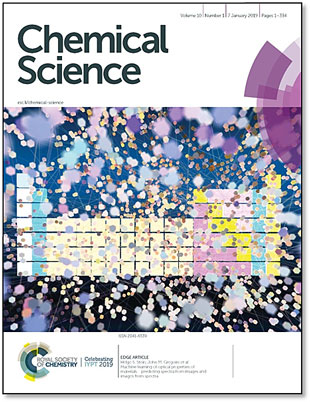
1. Engineering protein polymers of ultrahigh molecular weight via supramolecular polymerization: towards mimicking the giant muscle protein titin
Chem. Sci., 2019, Advance Article
DOI: 10.1039/C9SC02128K
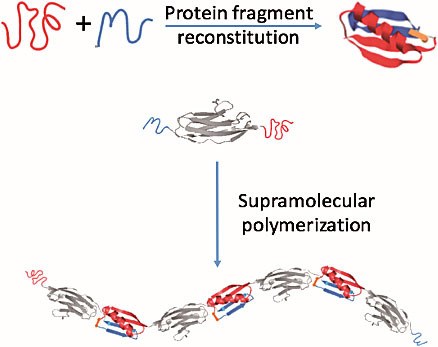
A team of researchers from China and Japan have developed a supramolecular polymerisation strategy to synthesise protein polymers with ultrahigh molecular weight that mimics the giant muscle protein titin. The scientists engineered protein macromonomers by protein fragment reconstitution to make protein polymers with an average molecular weight of 0.5MDa, which could be used for biomaterials with improved physical and mechanical properties.
Open Access(可免费阅读原文)
扫描或长按二维码,识别后直达原文页面,或点此查看原文

2. Electrochemical synthesis of Au@semiconductor core–shell nanocrystals guided by single particle plasmonic imaging
Chem. Sci., 2019, Advance Article
DOI: 10.1039/C9SC02804H
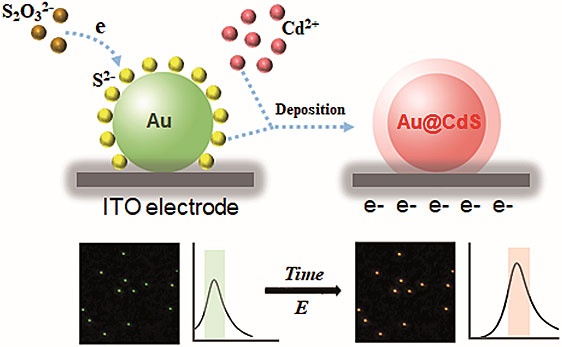
Scientists from Nanjing University have reported a new proof-of-concept strategy for controllable synthesis of metal@semiconductor core–shell nanocrystals through a combination of electrochemical deposition and plasmonic imaging. This simple and universal method leads to the improvement of plasmonic photocatalysts.
Open Access(可免费阅读原文)
扫描或长按二维码,识别后直达原文页面,或点此查看原文

Materials Horizons (IF: 14.356)
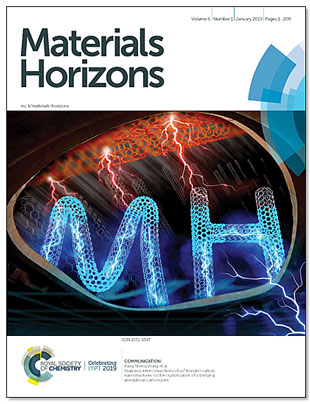
1. Spatially modulated stiffness on hydrogels for soft and stretchable integrated electronics
Mater. Horiz., 2019, Advance Article
DOI: 10.1039/C9MH01211G
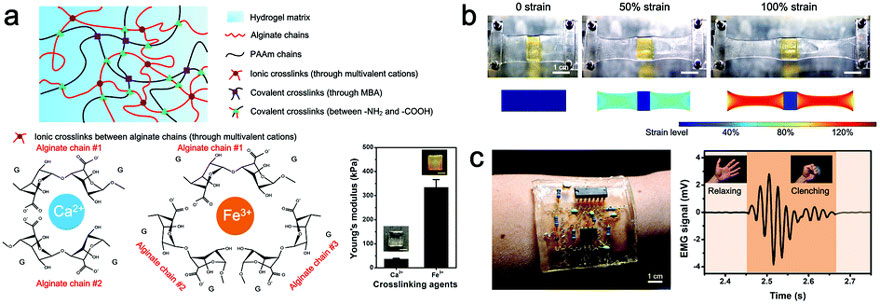
In this work, we proposed a local stiffening strategy through additional crosslinking on hydrogels for spatial modulation of hydrogel stiffness. This is a general method to manipulate the stiffness of hydrogel materials in a spatially programmable manner, and is the first time to realize integration of rigid electronic components with soft hydrogels for functional soft and stretchable electronics. Different from existing studies focusing on the modification of the bulky mechanical properties (e.g., stiffness) of hydrogels as a whole, this study presented the concept of locally stiffened hydrogels where the stiffness on different areas of a hydrogel varies. Based on this result, integration of commercial electronic components for functional hydrogel electronics is achieved, offering a promising solution to the conundrum of coupling rigid electronic components with soft substrate materials. In addition, this is also the first time that multi-index monitoring of human health conditions with stretchable and biocompatible hydrogels has been realized. This research article offers a novel route for spatially controllable modulation of the mechanical properties of soft materials. And it is believed to be helpful for the fabrication of functional stretchable electronics with emerging biomaterials, especially aiming at the most advanced wearable healthcare applications where biocompatibility and mechanical coupling with the human body are highly appreciated.
限时免费阅读原文,登录后可下载
扫描或长按二维码,识别后直达原文页面,或点此查看原文

2. Controllable and stable organometallic redox mediators for lithium oxygen batteries
Mater. Horiz., 2019, Advance Article
DOI: 10.1039/C9MH01043B
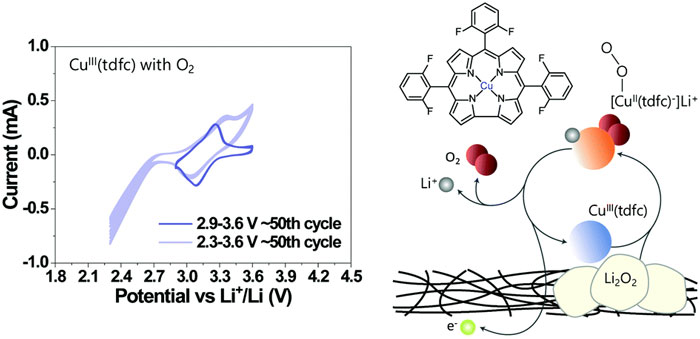
Rechargeable lithium–oxygen (Li–O2) batteries are very important due to their very high theoretical energy density. If they will work properly, they will be able to rival internal combustion engines in terms of energy density and cost, thus revolutionizing electro-mobility and ground transportation. The operation of rechargeable Li–O2 batteries depends crucially on the reversible formation/decomposition of Li2O2 at the cathode upon discharge/charge cycling. One of the greatest challenges with these systems is their recharge, i.e. decomposing Li2O2, at low enough potentials, that do not endanger the stability of the electrolyte solution and the carbon cathode. Since Li2O2 is electrically insulating, its decomposition requires a too high over-potential – above 1 V even at low rates. Consequently, it mandatory to use redox mediators (RMs) in solution phase in Li–O2 batteries is mandatory. Their appropriate selection is critically important. We seek for RMs that are oxidized on the cathodes of Li – ion cells low enough potentials and then these RMs oxidize the Li2O2 from solution phase. Unfortunately, many RMs suggested and tested so far suffer from intrinsic instability problems. We developed a systematic methodology to select them properly. Here we introduce corrole-chelated metal complexes as effective and intrinsically stable RMs for Li–O2 batteries. The properties of these RMs can be controlled by the nature of their central metallic and the corrole structure. By a systematic study we were able to find a new, intrinsically stable RM for Li–O2 cells – corrole-chelated copper complex and to prove its superiority over benchmark systems. We anticipate that this study will promote a rational design for the development of most suitable redox mediators for active metal (Li, Na) oxygen batteries.
限时免费阅读原文,登录后可下载
扫描或长按二维码,识别后直达原文页面,或点此查看原文

3. A highly asymmetric interfacial superstructure in WC: expanding the classic grain boundary segregation and new complexion theories
Mater. Horiz., 2019, Advance Article
DOI: 10.1039/C9MH00969H
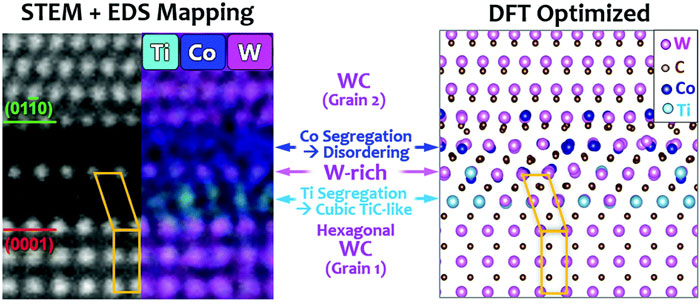
In this communication, we reveal a highly asymmetric interfacial superstructure at a mixed twist and tilt grain boundary (GB) of WC that significantly broadens our understanding of GB segregation structures. Specifically, this interfacial superstructure exhibits the following features that differ strikingly from all prior experimental observations and are beyond the predictions of any existing theoretical models: (i) the segregation profiles of Ti and Co are highly asymmetric; (ii) the maxima of the Ti and Co segregation both occur at the off-the-center atomic planes in the opposite sides, separated by a W-rich atomic layer in between; and (iii) solute segregations further induce asymmetric interfacial structural transitions, i.e., Ti segregation drives an interfacial symmetry change from the hexagonal WC grain to a cubic-TiC-like interfacial layer on the one side, while Co induces a partially-disordered segregation layer on the other side. Such a highly asymmetric interfacial superstructure is not anticipated from the classic Langmuir–Mclean type GB segregation model, as well as the newer diffuse-interface and multilayer lattice-adsorption models; moreover, it is beyond (differs significantly from) the Dillon-Harmer complexions and recent observations of several other interfacial superstructures. Yet, we expect that similar highly asymmetric interfacial superstructures may not be uncommon (despite being unrecognized in prior studies), and we propose factors favoring their formation. Thus, this study extends our fundamental knowledge of atomic level GB segregation structures, which can have broad technological implications.
限时免费阅读原文,登录后可下载
扫描或长按二维码,识别后直达原文页面,或点此查看原文

Biomaterials Science (IF: 5.831)
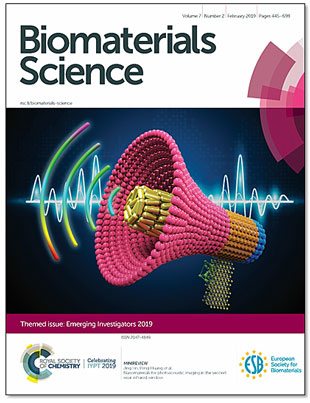
1. Cell-imprinted biomimetic interface for intelligent recognition and efficient capture of CTCs
Biomater. Sci., 2019, Advance Article
DOI: 10.1039/C9BM01008D
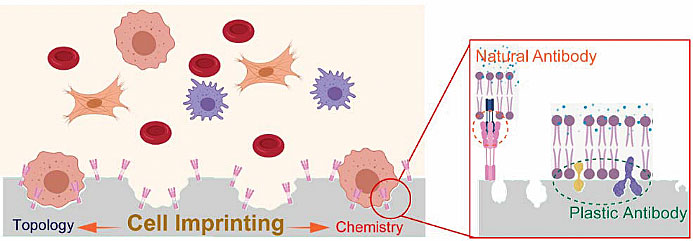
The presence of CTCs is a dangerous signal for tumor progression, as they leak into the blood stream from the primary tumor and could potentially invade to other organs, causing metastasis. Unfortunately, they’re extremely rare and thus hard to identify, which poses great challenges for early tumor diagnosis. In a recent publication in Biomaterials Science, Gao et al from Shanghai Jiao Tong University developed a cell-imprinted biomimetic interface, which could intelligently recognize and efficiently capture CTCs, with an over 55% capture efficiency towards spiked MCF-7 cells, a human breast cancer cell line, from rabbit whole blood samples.
限时免费阅读原文,登录后可下载
扫描或长按二维码,识别后直达原文页面,或点此查看原文

如果篇首注明了授权来源,任何转载需获得来源方的许可!如果篇首未特别注明出处,本文版权属于 X-MOL ( x-mol.com ), 未经许可,谢绝转载!































 京公网安备 11010802027423号
京公网安备 11010802027423号